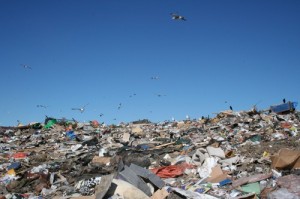 Industry production systems underlying the Food, Energy, and Water (FEW) Nexus have traditionally treated pollution and waste as externalities that often end up in a landfill. Food waste is the single largest component of municipal solid waste reaching landfills today and is often the byproduct of many FEW Nexus inefficiencies. Inefficiencies that can be addressed through technologies such as anaerobic digesters. In the U.S., food harvesting, processing, and transportation accounts for 10 percent of our energy. However, 40 percent of food goes uneaten and Americans are not only wasting the equivalent of $165 billion each year on this organic compound, but this food waste also adversely affects fresh water, chemicals, energy, and land.
Industry production systems underlying the Food, Energy, and Water (FEW) Nexus have traditionally treated pollution and waste as externalities that often end up in a landfill. Food waste is the single largest component of municipal solid waste reaching landfills today and is often the byproduct of many FEW Nexus inefficiencies. Inefficiencies that can be addressed through technologies such as anaerobic digesters. In the U.S., food harvesting, processing, and transportation accounts for 10 percent of our energy. However, 40 percent of food goes uneaten and Americans are not only wasting the equivalent of $165 billion each year on this organic compound, but this food waste also adversely affects fresh water, chemicals, energy, and land.
Food waste typically ends up in landfills where organic matter accounts for 16 percent of U.S. methane emissions. Implementing cleaner and more efficient food waste disposal practices can reduce not only carbon emissions but can also help displace water-intensive fossil-based energy generation. By installing stand-alone anaerobic digesters with better gas collection systems at existing landfills, these facilities can operate more efficiently by generating cleaner biogas rather than siloxane contaminated landfill gas. Additionally, the anaerobic digestion process produces clean digestate that can be used to displace petroleum-based fertilizers and create additional revenue for the facilities. Implementing changes to the FEW Nexus that would encourage landfills, which by tonnage are largely privately-owned, to utilize anaerobic digesters face challenges. For example, anaerobic digesters have historically been expensive to operate and have challenges economically as the price of fossil fuels decreases.
State and local policy measures including food waste separation ordinances as well as bans on landfilling organic wastes could help promote anaerobic digesters. Policymakers could also create market incentives for energy savings derived from food wastes.
There are several ways to tackle this. Policy is the key. San Francisco is becoming a zero waste city for example. When there are policies in place that push for organic waste… Read more »